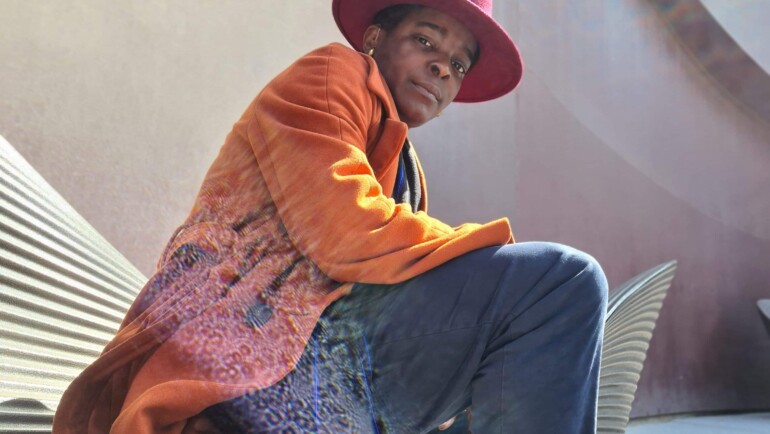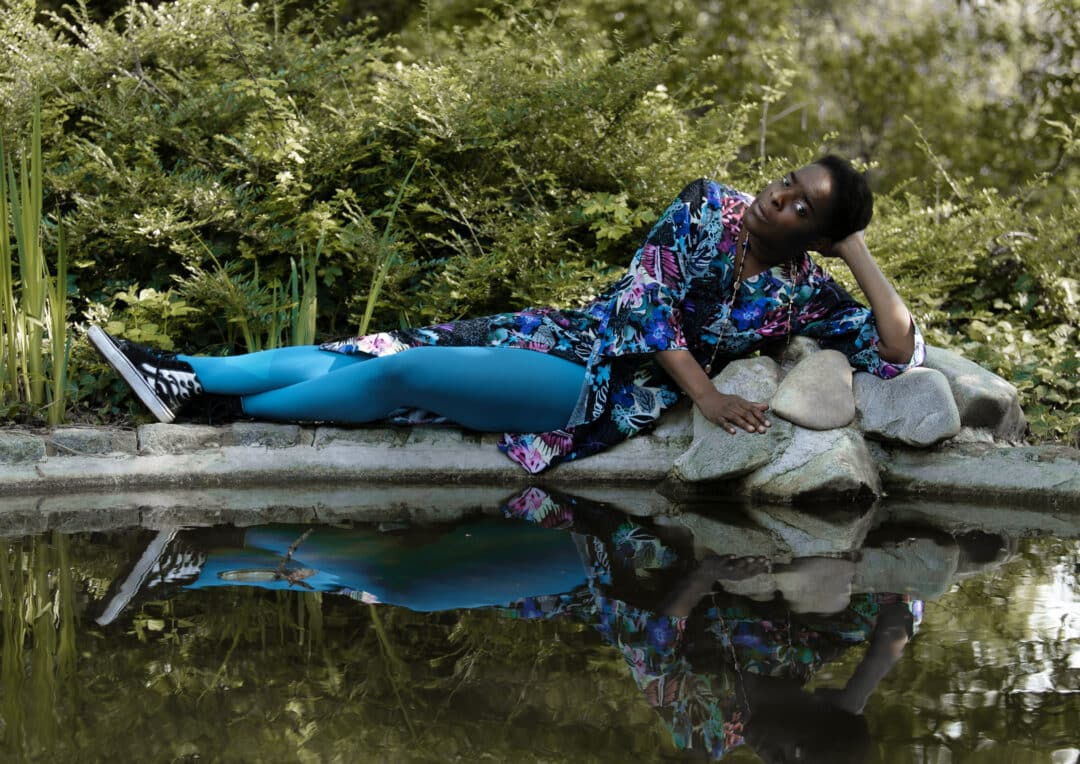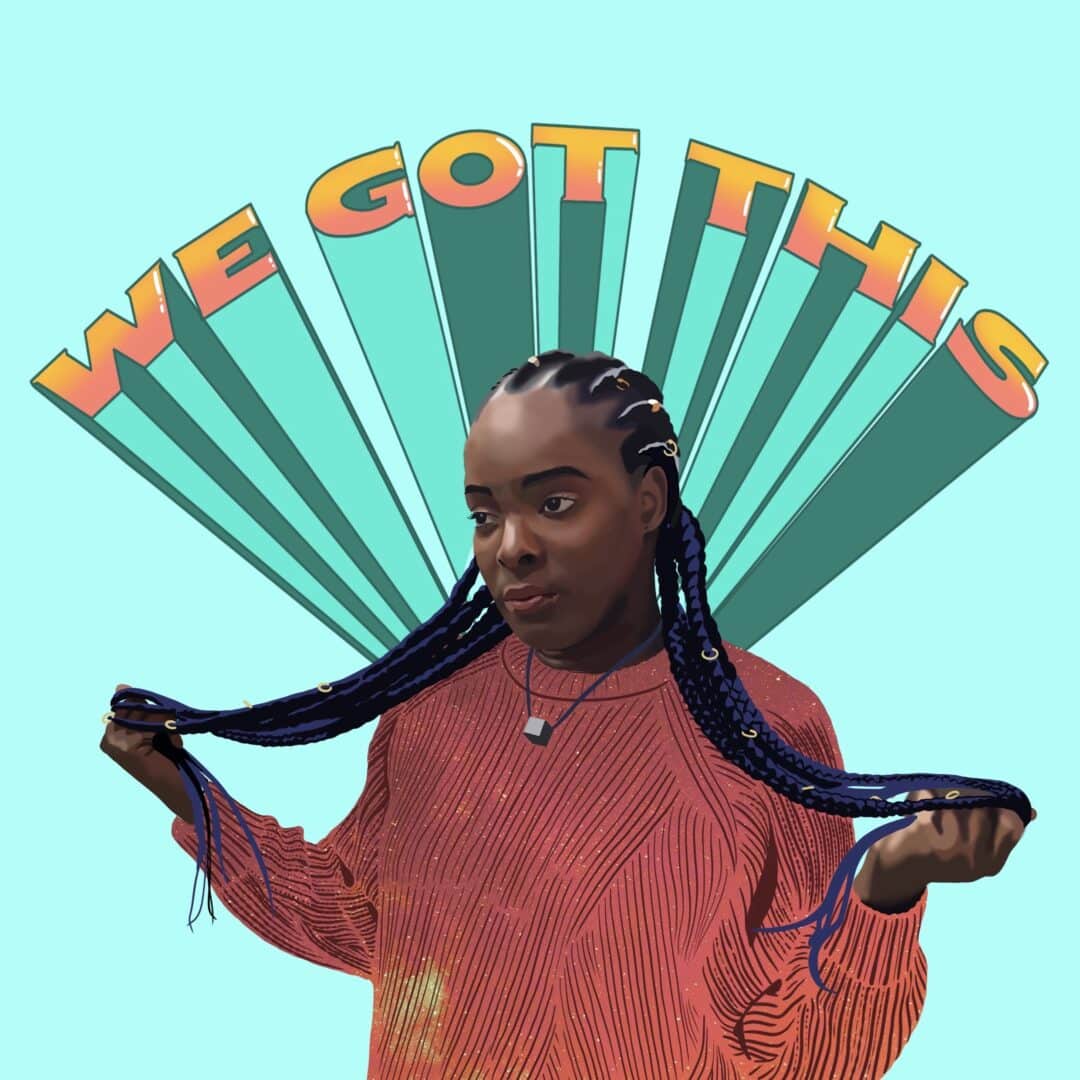
As the line from her song “Protest” makes clear, action is one of the main themes of Cyon Flex‘s new album We Got This.The album is one of the most political yet by the longtime Vienna musician, as she continues to work for the visibility and acknowledgment of her music and its message. In this interview, she talks with Tonica Hunter about the motivations behind her new album.
Tonica Hunter: [third call attempt] Y-o-o-o-o!
Cyon Flex: Hey – OK, that’s working now. My flat has no signal; it’s like steel everywhere. Anyway…
[laughs] All good, all good, we’re here now.
Cyon Flex: Yeah sure – how are you?
I’m good, actually. You’ve been busy working on your latest project – release is on the 2nd of June, right?
Cyon Flex: Yeah, yeah.
“It’s about how I feel as a human being.”
Tell me, what was the journey like to this point? Where did this album kind of come from?
Cyon Flex: I had the artwork for it a while back. The inspiration for it was the 2020 BLM protests. I felt I had a voice, I was not invisible anymore and I had a voice, a humanity. And this is something I wanted to realize on this album. It’s about how I feel as a human being, how I want to interact with others and what living as a strong black woman has meant for me. Whether I can even take that role.
In the track “Kommando”, I say: “I cannot carry the weight of the world into perpetuity.” Sometimes the weight is heavy. And knowing what I know – [what it’s like] to be in pain, to be hurt – I am sensitive to seeing that in the world. I’m more sensitive because of it, and it brings out an empathic side of me, it affects me deeply. This album is an outward expression of what I want for the world, but deal with on the inside.
Going back to the protests that informed your work: I mean, you’re really on these streets, you have a clearly ‘artivist’ role in your work. I’ve seen you in different spots and times in Vienna at protests, speaking, performing, marching: from Fridays for Future to supporting queer spaces, for different rights and groups. You’re really out there.
Cyon Flex: Yeah I am, I’m always out there protesting about this. But at some point I thought: my pain is my protest. This is part of it. It’s not only about holding a sign on the street. And that is why activism is more prominent in this album. I’ve been trying to make sense of my experience in Austria and reflect on that and to bring that forward in a deeper way. My last album, Loyalty, was to show I can do club tracks, I can do bangers and dance music – but this is more heartfelt and it builds upon messages from previous albums too. This is more unafraid.
I like that for you. What released you from that fear?
Cyon Flex: Having gone through a lot of my experiences and being misunderstood brought me to a point where I thought: I have to say something about this, let me just bring it forth. Sometimes we can feel very alone here, ‘cause it’s quite closed in terms of being able to express one’s emotions. I wanted to strip it back, get to the rawness again and send it out there, in a way that is authentic but that will also be received as it’s intended, not causing offense. I just want to tell the truth and have the listener relate to what I’m saying as a human being, speaking from my heart. I am trying to bring it to people in a way they can accept.
“It’s me from the margins, talking to the mainstream.”
I feel like there’s a lot that you are evoking from the specifics of your perspective and experiences, but that there’s also this desire to reach people who maybe can’t directly relate to that. Who is We Got This for? Who is it addressing?
Cyon Flex: We Got This is for Austrian society as a whole, and We Got This is for Black people – to empower and inspire us to say: “we have this – we can make something of it and make our own vision and place for ourselves, and be seen.” [pauses to think]
It is me from the margins, talking to the mainstream.
It is also me talking to myself. I’ve always relied on myself and been my own manager, so to speak. It is me telling me that I can rely on myself, that ‘I got this’, and that I have myself too. [Now that I’m 35,] I often think about what I would say to the younger me – how I would speak to her, and what messages I want to put out there about self-worth and value. To the woman at home and disillusioned in relationships, too. My message is especially for women.
How do you deal with raising awareness and at the same time ‘calling in’ people and creating allyships through your music?
Cyon Flex: My current producer, Def Ill, is on this album, yeah. He’s a rapper from Linz who is left and political – he is also talking about current issues or about people who are considered to be ‘the underclass’. He is helping to give a voice to those people – and to me too.
Super important.
Cyon Flex: Yeah. That’s exactly what I want to do – it comes from the feeling of being on the margins. And I don’t want anyone to feel that way. People can be with me – come under my tent, into my space and feel welcome. It’s about finding the common threads between us all, showing that, and definitely revealing the humanity of everyone. At the same time I am very cautious of talking about my experience in a way that isn’t ostracizing people, so it is a fine line.

Yeah, but surely you can refer to “white supremacy” without having to add the caveat “not all white people” – I find that so tiring to have to defend or justify. What I found intriguing is that you bleeped out the word ‘white’ in your song “Maddest”. We are absolutely going to say ‘Black’ with our chests, though! [laughs]
Cyon Flex: [laughs] Yeah – my thinking was: I don’t want people to discount what I have said by hearing “white supremacy” and shutting down or switching off from the rest of my message. You know, my producer who produced that track was even able to understand that. It is a balance. I am neither out here looking for pity, nor am I picking fights.
“You cannot hide pain or anger.”
I hear that. And also the labeling of political messaging in music, depending on who says it, is very loaded, so as a member of an already-marginalized group, one has to be conscious of that somehow. You also talk quite openly about anger and rage, and I think that is an important way of owning those feelings.
Cyon Flex: I think rage is what people pick up on here, and at the same time, people are kind of afraid of how I choose to express that. I grew up in a context – Bristol, UK – where people were free to express their feelings. I don’t feel that expressing them is strange. But I think the outward expression is not the done thing here. You have to hide it – but you cannot hide pain or anger; it’s always there, under the surface. I don’t have a private or public face. I don’t hide who I am. My music is about freedom. Freedom to be yourself.
Right.
Cyon Flex: I have to be outspoken. I have to meet my own needs.
What are those needs, let’s say, when it comes specifically to the Austrian musical landscape and your career here?
Cyon Flex: I grew up in the industry knowing how to burn and sell CDs. I didn’t grow up knowing how to apply for funding for this, that and the other – because I haven’t had access to funding. CDs and getting them out there: that’s how I built my career. This “using the state” to advance my career, I am new to that.
“There Ain’t nobody I can turn to and say: ‘Put me on that show.'”
I mean, you’re touching on so much here: access, social capital, knowledge of the (German) language…but then also funding and art/cultural jargon, and even knowing those things are out there to get in the first place. Especially here in Austria, there are so many resources – it’s just knowing how to get to it.
Cyon Flex: There ain’t nobody that I can turn to and say: put me on this show or that show; it’s about me and getting myself out there. I work with my producers, and they work on my tracks. Other people have helped me too. I’ve had some leads here and there, but it is mainly me telling people about what I do and going to the events. That’s how I have built myself to date. I’d like some support – label or otherwise – to help me elevate me. I do think it is a class-related thing; it could go a bit faster for me. I do feel a bit slept on. I just want more people to be able to tap into what I’m doing. I’m looking for quality and access for myself, and that naturally paves the way for others. Because we are working professionally, but are still kept out of the mainstream industry here in Austria.
Yeah, well, Austria stays sleeping on Black talent sometimes – but despite that I have to give you props for your own success until now.
Cyon Flex: Thank you – and yeah, I have to think about the community I have here. The community in Wien is truly a blessing to live in. I had lived in a very heteronormative, homophobic, chauvinistic community before back in Bristol. So I feel very fortunate to be in a somewhat inclusive community here. But I don’t think all of my experience can be linked to one community – as a Black person, I can relate to many different communities, but the specifics of the Black experience are so particular.
“We are trailblazers.”
For sure.
Cyon Flex: I think in general our community needs to be better funded. We are trailblazers; there needs to be more focus on the things we are doing and more support for that. I think funding should be made a lot more accessible. We need more creative spaces to be opened up to the scene and the talent we have – many [promoters, institutions, etc.] know us already. They should book us. If they don’t know us, they can go to databases – mica – music austria has one. You know? They are out there. We used to have something we called a ‘hijack’ in Bristol – a website which connected artists and promoters via a message board. But also connected with institutions, spaces and establishments. Vienna should push more for these kinds of resources and networking events.

Definitely. And making those demands is so important, too. What I love about this latest album is that you’re speaking directly to needs and feelings – a bit like you’re speaking to me now, but even more so on tracks like “Protest” and “Drawn” – in this sort of manifesto, stream-of-consciousness style. “Maddest” goes hard too. That’s a particularly deep track for me. It also feels like an album you could – and should – play at a demonstration or a protest. I think this music has such an important role to play where we are now: a society that is increasingly vocal in a context like Vienna, where the expression of sociopolitical frustrations and needs is more necessary than ever.
Cyon Flex: Yeah. I mean, the whole album is bars on bars. [both laugh]
Cyon Flex: [rapping] “My pain is my protest, yes / this is not a drill this is real life / My performance is devastating / it’s all over my heart, all over my face.” So that’s the track “Protest”. And with “Rudeclub”, I’m saying ‘I’m in charge of my life and I make the rules’. I’m definitely coming into my own power now.
I am just looking forward to hearing these tracks live. Release and concert is on June 2nd, right?
Cyon Flex: Yeah, I’ll be glad if you can make it.
I’ll be there.
Album release concert
June 2nd, 5pm – 8pm, Banc Public Records (Schulgasse 31, 1180 Wien)
